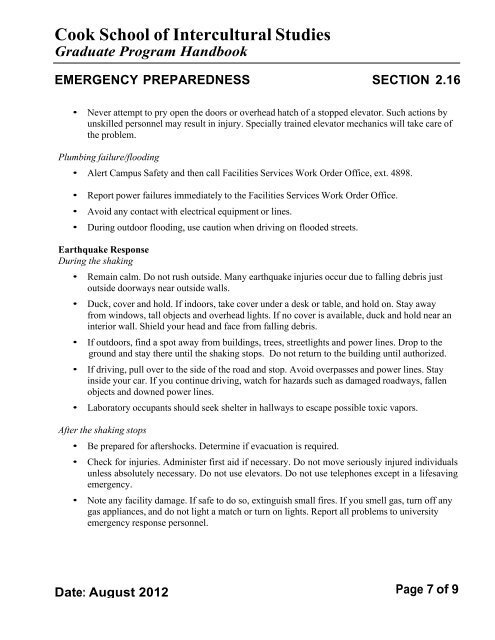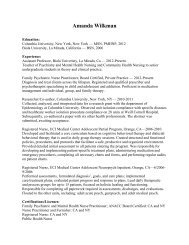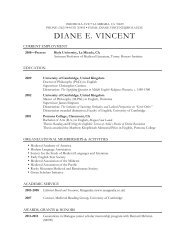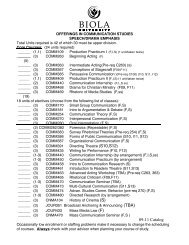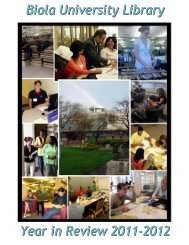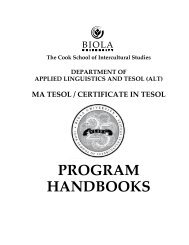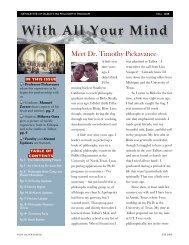PROGRAM HANDBOOKS - Biola University
PROGRAM HANDBOOKS - Biola University
PROGRAM HANDBOOKS - Biola University
Create successful ePaper yourself
Turn your PDF publications into a flip-book with our unique Google optimized e-Paper software.
Cook School of Intercultural Studies<br />
Graduate Program Handbook<br />
EMERGENCY PREPAREDNESS SECTION 2.16<br />
• Never attempt to pry open the doors or overhead hatch of a stopped elevator. Such actions by<br />
unskilled personnel may result in injury. Specially trained elevator mechanics will take care of<br />
the problem.<br />
Plumbing failure/flooding<br />
• Alert Campus Safety and then call Facilities Services Work Order Office, ext. 4898.<br />
• Report power failures immediately to the Facilities Services Work Order Office.<br />
• Avoid any contact with electrical equipment or lines.<br />
• During outdoor flooding, use caution when driving on flooded streets.<br />
Earthquake Response<br />
During the shaking<br />
• Remain calm. Do not rush outside. Many earthquake injuries occur due to falling debris just<br />
outside doorways near outside walls.<br />
• Duck, cover and hold. If indoors, take cover under a desk or table, and hold on. Stay away<br />
from windows, tall objects and overhead lights. If no cover is available, duck and hold near an<br />
interior wall. Shield your head and face from falling debris.<br />
• If outdoors, find a spot away from buildings, trees, streetlights and power lines. Drop to the<br />
ground and stay there until the shaking stops. Do not return to the building until authorized.<br />
• If driving, pull over to the side of the road and stop. Avoid overpasses and power lines. Stay<br />
inside your car. If you continue driving, watch for hazards such as damaged roadways, fallen<br />
objects and downed power lines.<br />
• Laboratory occupants should seek shelter in hallways to escape possible toxic vapors.<br />
After the shaking stops<br />
• Be prepared for aftershocks. Determine if evacuation is required.<br />
• Check for injuries. Administer first aid if necessary. Do not move seriously injured individuals<br />
unless absolutely necessary. Do not use elevators. Do not use telephones except in a lifesaving<br />
emergency.<br />
• Note any facility damage. If safe to do so, extinguish small fires. If you smell gas, turn off any<br />
gas appliances, and do not light a match or turn on lights. Report all problems to university<br />
emergency response personnel.<br />
Date: August 2012<br />
Page 7 of 9


